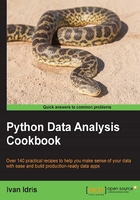
A conjecture about the future
The future is a bright place, where an incredible amount of data lives in the Cloud and software runs on any imaginable device with an intuitive customizable interface. (I know young people who can't stop talking about how awesome their phone is and how one day we will all be programming on tablets by dragging and dropping). It seems there is a certain angst in the Python community about not being relevant in the future. Of course, the more you have invested in Python, the more it matters.
To figure out what to do, we need to know what makes Python special. A school of thought claims that Python is a glue language gluing C, Fortran, R, Java, and other languages; therefore, we just need better glue. This probably also means "borrowing" features from other languages. Personally, I like the way Python works, its flexible nature, its data structures, and the fact that it has so many libraries and features. I think the future is in more delicious syntactic sugar and just-in-time compilers. Somehow we should be able to continue writing Python code, which automatically is converted for us in concurrent (machine) code. Unseen machinery under the hood manages lower level details and sends data and instructions to CPUs, GPUs, or the Cloud. The code should be able to easily communicate with whatever storage backend we are using. Ideally, all of this magic will be just as convenient as automatic garbage collection. It may sound like an impossible "click of a button" dream, but I think it is worth pursuing.